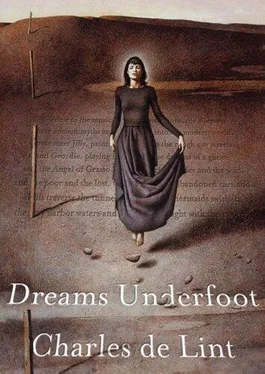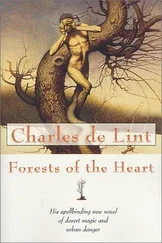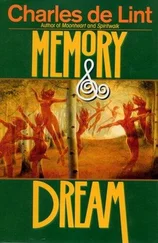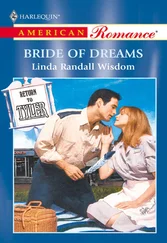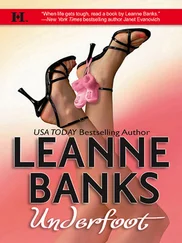There was a ringing in her ears—sharp and loud, like thunderclaps erupting directly above her. She felt as though she was in an earthquake, her body being violently shaken. Everything felt topsyturvy.
There was no up and no down, just a sense of vertigo and endless spinning, a roar and whorl of shouting and shaking until
She snapped her eyes open to find Geordie’s worried features peering out at her from the circle that the fur of his parka hood made around his face. He was in the Buick with her, on the front seat beside her. It was his hands on her shoulders, shaking her; his voice that sounded like thunder in the confines of the Buick.
The Buick.
And then she remembered: walking in the Tombs, the storm, climbing into the car, falling asleep ...
“Jesus, Jilly,” Geordie was saying. He sat back from her, giving her a bit of space, but the worry hadn’t left his features yet. “You really are nuts, aren’t you? I mean, falling asleep out here. Didn’t you ever hear of hypothermia?”
She could have died, Jilly realized. She could have just slept on here until she froze to death and nobody’d know until the spring thaw, or until some poor homeless bugger crawled in to get out of the wind and found himself sharing space with Jilly, the Amazing Dead Woman.
She shivered, as much from dread as the storm’s chill. “How ... how did you find me?” she asked.
Geordie shrugged. “God only knows. I got worried, the longer you were gone, until finally I couldn’t stand it and had to come looking for you. It was like there was a nagging in the back of my head—sort of a Lassie kind of a thought, you know?”
Jilly had to smile at the analogy.
“Maybe I’m getting psychic—what do you think?” he asked. “Finding me the way you did, maybe you are,” Jilly said.
She sat up a little straighter, then realized that sometime during her sleep, she had unbuttoned her parka enough to stick a hand in under the coat. She pulled it out and both she and Geordie stared at what she held in her mittened hand.
It was a small violet flower, complete with roots.
“Dilly, where did you ... ?” Geordie began, but then he shook his head. “Never mind. I don’t want to know.”
But Jilly knew. Tonight was the anniversary, after all. Babe or Frank, or maybe both of them, had come by as well.
If you don’t forget us, we’ll never be gone.
She hadn’t.
And it looked like they hadn’t either, because who else had left her this flower, and maybe sent Geordie out into the storm to find her? How else could he have lucked upon her the way he had with all those blocks upon blocks of the Tombs that he would have to search?
“Are you going to be okay?” Geordie asked.
Jilly stuck the plant back under her parka and nodded. “Help me home, would you? I feel a little wobbly.”
“You’ve got it.”
“And Geordie?”
He looked at her, eyebrows raised.
“Thanks for coming out to look for me.”
It was a long trek back to Jilly’s loft, but this time the wind was helpful, rather than hindering. It rose up at their backs and hurried them along so that it seemed to only take them half the time it should have to return. While Jilly changed, Geordie made great steaming mugs of hot chocolate for both of them.
They sat together on the old sofa by the window, Geordie in his usual rumpled sweater and old jeans, Jilly bundled up in two pairs of sweatpants, fingerless gloves and what seemed like a halfdozen shirts and socks.
Jilly told him her story of finding about the gemmin, and how they went away. When she was done, Geordie just said, “Wow. We should tell Christy about them—he’d put them in one of his books.”
“Yes, we should,” Jilly said. “Maybe if more people knew about them, they wouldn’t be so ready to go away.”
“What about Mr. Hodgers?” Geordie asked. “Do you really think they took him away with them?”
Jilly looked at the newly potted flower on her windowsill. It stood jauntily in the dirt and looked an awful lot like a drawing in one of her sketchbooks that she hadn’t drawn herself
“I like to think so,” she said. “I like to think that St. Vincent’s was on the way to wherever they were going.” She gave Geordie a smile, more sweet than bitter. “You couldn’t see it to look at him,” she added, “but Frank had violet eyes, too; he had all kinds of memories stored away in that old head of his—just like Babe did.”
Her own eyes took on a distant look, as though she was looking into the faraway herself, through the gates of dream and beyond the fields we know.
“I like to think they’re getting along just fine,” she said.
We are standing in the storm of our own being.
—Michael Ventura
“I was a beauty once,” the old woman said. “The neighborhood boys were forever standing outside my parents’ home, hoping for a word, a smile, a kiss, as though somehow my unearned beauty gave me an intrinsic worth that far overshadowed Emma’s cleverness with her schoolwork, or Betsy’s gift for music. It always seemed unfair to me. My value was based on an accident of birth; theirs was earned.”
The monster made no reply.
“I would have given anything to be clever or to have had some artistic ability,” the old woman added.
“Those are assets with which a body can grow old.”
She drew her tattery shawl closer, hunching her thin shoulders against the cold. Her gaze went to her companion. The monster was looking at the blank expanse of wall above her head, eyes unfocused, scars almost invisible in the dim light.
“Yes, well,” she said. “I suppose we all have our own cross to bear. At least I have good memories to go with the bad.”
The snow was coming down so thickly that visibility had already become all but impossible. The fat wet flakes whirled and spun in dervishing clouds, clogging the sidewalks and streets, snarling traffic, making the simple act of walking an epic adventure. One could be anywhere, anywhen. The familiar was suddenly strange; the city transformed. The wind and the snow made even the commonest landmarks unrecognizable.
If she hadn’t already been so bloody late, Harriet Pierson would have simply walked her mountain bike through the storm. She only lived a mile or so from the library and the trip wouldn’t have taken that long by foot. But she was late, desperately late, and being sensible had never been her forte, so there she was, pedaling like a madwoman in her highest gear, the wheels skidding and sliding for purchase on the slippery street as she biked along the narrow passageway between the curb and the crawling traffic.
The socalled waterproof boots that she’d bought on sale last week were already soaked, as were the bottoms of her jeans. Her old camel hair coat was standing up to the cold, however, and her earmuffs kept her ears warm. The same couldn’t be said for her hands and face. The wind bit straight through her thin woolen mittens, her cheeks were red with the cold, while her long, brown hair, bound up into a vague bun on the top of her head, was covered with an inch of snow that was already leaking its wet chill into her scalp.
Why did I move to this bloody country? she thought. It’s too hot in the summer, too cold in the winter ...
England looked very good right at that moment, but it hadn’t always been so. England hadn’t had Brian whom she’d met while on holiday here in Newford three years ago, Brian who’d been just as eager for her to come as she had been to emigrate, Brian who walked out on her not two months after she’d arrived and they had gotten an apartment together. She’d refused to go back. Deciding to make the best of her new homeland, she had stuck it out surprisingly well, not so much because she led such an ordered existence, as that she’d refused to run back home and have her mother tell her, ever so patronizingly,
Читать дальше
